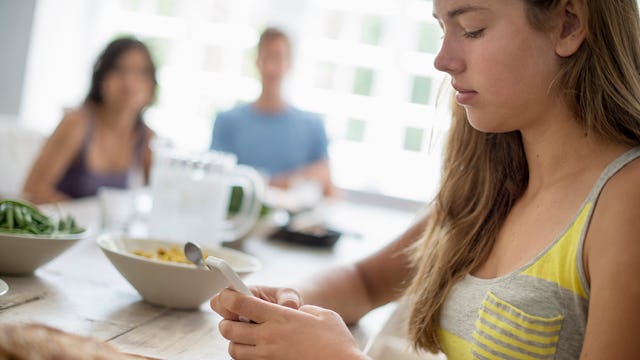AAP Weighs In On Kids And Weight — And Parents Aren't Helping Things

Overweight children who are made to feel bad about their weight are more likely to binge eat and isolate themselves
We always want what is best for our kids. And though our intentions may come from a place of love and concern for their wellbeing, if our child is struggling with their weight, constant attention or shame about the issue may only make matters worse.
Overweight children who are stigmatized or made to feel bad about their weight are more likely to binge eat and isolate themselves, says the American Academy of Pediatrics (AAP). The organization, along with the Obesity Society, came out with a new policy statement in an effort to help parents, teachers, and pediatricians understand the negative consequences that can come from continuously harping on our kids to lose weight.
“We see a growing problem regarding weight stigma. In a misguided attempt to get kids to change, people end up reinforcing negative coping behaviors,” lead author Dr. Stephen Pont said. But rather than motivating kids to lose weight, labeling them “obese” and “fat” actually causes children to be less physically active and binge eating and social isolation more likely to occur.
The percentage of children considered obese has more than tripled since the 1970s in the United States according to the CDC. Today, approximately one in five school-aged children is considered to be obese. But the AAP cautions pediatricians to use words like “body mass index” and weight” when dealing with overweight children.
“We saw an opportunity to make providers aware of the stigma and to make the public aware of the weight stigma,” Pont noted. Instead of motivating a person to lose weight, consistently labeling and concentrating on the weight itself can have the opposite effect. It also ignores the emotional and social issues many of these kids experience.
And it’s not just pediatricians and peers that need to heed the warning. According to the statement, parents “have also been identified as a source of weight-based victimization toward youth with obesity. In a survey study of adolescents attending weight-loss camps, 37% reported they had been teased or bullied about their weight by a parent,” the study noted.
Researchers assessing experiences of weight stigma among women with obesity found that family members were reported to be “the most prevalent interpersonal source of weight-stigma incidents,” with a whopping 53 percent reporting they had experienced weight stigma from their mothers and 44 percent reporting it from their fathers. They found weight stigma expressed by parents can have a lasting effect on children.
So what can we all do to stop the damage being done? Researchers recommend parents in particular be mindful of the words they are using around their kids. Encouraging kids to make positive changes and everyone joining in on a healthier lifestyle can also help. “Let your child guide the ship and choose what to change. Maybe the family — yes, family, so you don’t isolate the kiddo — will start eating more fruits and vegetables,” researcher Steven Pont said.
Getting a child’s doctor involved earlier can also help. Concentrating on building healthy eating habits early and determining how and if your child is on the right path is something pediatricians should be involved in.
Finally, don’t make a child’s weight the center of a public discussion. With the holidays here, researchers agreed it is not the time to take a stand. When it comes to our kid’s weight, “the Thanksgiving table is not an appropriate place to be commenting,” they stressed. Let kids enjoy special days and understand it will not be a quick fix but consistent changes over the course of time that will end up benefiting them the most.